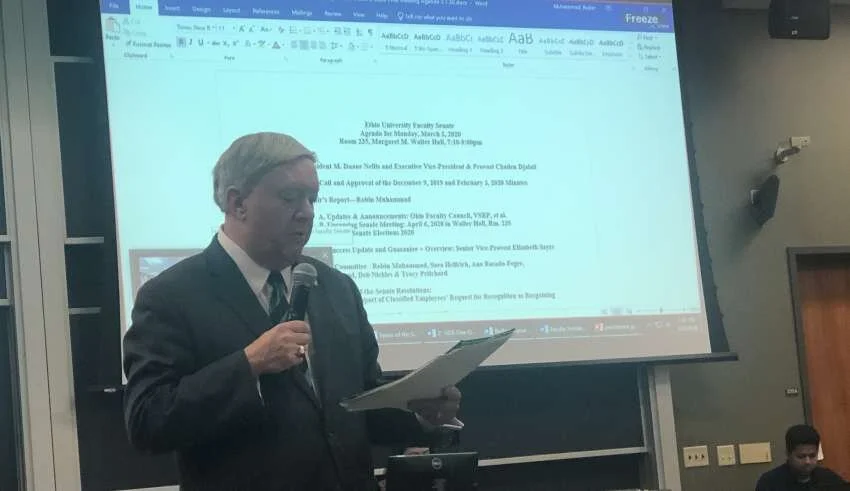Emergency powers granted to President Nellis at Trustees meeting
Ohio U President Duane Nellis addressing Faculty Senate in March. Photo by Emily Zeiler.
The Ohio University Board of Trustees granted President Duane Nellis more power, halted an increase in tuition, rejected a collective bargaining agreement and approved the creation of five new academic programs Monday during its public video conference meeting.
In light of the global coronavirus pandemic, the Trustees expanded on the powers of the president during times of emergency. This resolution grants the president broad powers during times of crisis to maintain the safety and health of the university community.
The resolution states, “The Board of Trustees authorizes the president, now and in the future, when faced with a national, state or local state of emergency declaration, in consultation to the extent practicable with leadership of the Board of Trustees and the university, to oversee and direct all steps necessary to protect the health, safety and welfare of the campus community.”
During Nellis’ report to the body, Nellis walked back some of his prior statements about the dismissal of university employees.
“I cannot promise to hold any area harmless from budget reductions if we are to ensure the stable future of our university,” he said.
This came in contrast to a previous statement made by Nellis, when he said that Ohio U would pause personnel-related cuts during COVID-19.
Nellis also responded to Faculty Senate’s recent May 4 vote of no confidence in the president.
“I was disappointed in the vote of the Faculty Senate last Monday, but I'm not going reclude me and my leadership team from continuing to have conversations, to share information and to invite faculty to join us in working together,” Nellis said.
The Trustees rejected a collective bargaining agreement with the American Federation of State, County & Municipal Employees (AFSCME), despite having a similar agreement with the union since 2017. They discussed how COVID-19 created a financial situation that did not exist at the time of the agreement's original negotiation.
Over 500 of AFSCME’s members work for Ohio U in some capacity, according to John Johnson, the AFSCME Regional Director. The Trustees will renegotiate the agreement with AFSCME at a later time.
“Our next step is to get back to the negotiating table. This is not unusual. Contracts get rejected all the time,” Johnson said. “Our members overwhelmingly passed the agreement. We're just gonna have to get back to the table and see what issues they want to discuss.”
The Trustees also approved a halt on tuition, room and board increases for undergraduate students.
More graduate students will be able to qualify for in-state tuition rates after the Trustees’ approval of another resolution. The resolution enables graduate students who received their undergraduate degree at an Ohio college to qualify for the in-state tuition rate.
They also approved a series of resolutions that created five new academic programs at Ohio U. The new programs consist of one bachelors and four masters degree options.
The sole bachelors program created will be in hospitality management. The new masters programs offered will be in theater education; project management; translational biomedical sciences and sustainability security and resilience in environmental studies.
The Board also elected Janelle Coleman to the chair of the body and Gary Cooper to vice chair.

